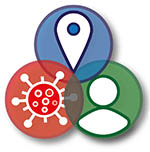
Understanding and controlling COVID-19 virus transmission risk on public transport
The PROTECT COVID-19 National Core Study on transmission and environment is hosting a series of free evidence seminars on understanding and controlling the risk of COVID-19 virus transmission in specific sectors. The first seminar, on the transport sector, will be at 9.30-11.00am on Friday 1 October.
This seminar will outline what is currently know about transmission of the COVID-19 virus on public transport, assessing the impact of environmental, social and behavioural factors, as well as vaccination, and control measures put in place by transport operators.
The session will bring together findings from a number of ongoing research studies into the issue, including Theme 3 of PROTECT, alongside the Engineering and Physical Sciences Research Council (EPSRC)-funded VIRAL and TRACK projects, led by UCL and the University of Leeds, respectively. The speakers will present data from modelling, environmental sampling and qualitative studies.
The aim of the seminar is to give those involved in the operation of public transport services, as well as relevant government policymakers, a useful understanding of the relevant transmission risk factors and what works to address them. This knowledge should, in turn, help these stakeholders take steps that restore public confidence in the safety of transport systems – an important component of returning society to more ‘normal’ operation.
Chair: Professor Andrew Curran, Chief Scientific Adviser, Health and Safety Executive
Speakers and presentations:
- Professor Martie Van-Tongeren, Professor of Occupational and Environmental Health, The University of Manchester – Perceptions of COVID-19 transmission risk and effectiveness of mitigation on public transport. View a pdf of Prof Van-Tongeren’s presentation.
- Professor Cath Noakes, Professor of Environmental Engineering for Buildings, University of Leeds – Understanding the factors that influence COVID-19 transmission mechanisms on public transport
- Dr Taku Fujiyama, Associate Professor of Transport Studies, and Dr Liora Malki-Epshtein, Associate Professor of Urban Fluid Mechanics and Air Quality, University College London – Understanding the risks of virus transmission on London’s public transport vehicles. View a pdf of Dr Fujiyama’s presentation.
 Professor Cath Noakes OBE is a chartered mechanical engineer, with a background in fluid dynamics. She leads research into ventilation, indoor air quality and infection control in the built environment. Her research focuses on experimental and modelling based studies, to explore the transport of airborne pathogens, the influence of indoor airflows, and the effectiveness of engineering approaches to controlling airborne disease transmission, including within healthcare settings.
Professor Cath Noakes OBE is a chartered mechanical engineer, with a background in fluid dynamics. She leads research into ventilation, indoor air quality and infection control in the built environment. Her research focuses on experimental and modelling based studies, to explore the transport of airborne pathogens, the influence of indoor airflows, and the effectiveness of engineering approaches to controlling airborne disease transmission, including within healthcare settings.
Cath is currently Deputy Director of Leeds Institute for Fluid Dynamics, and Co-Director of the EPSRC Centre for Doctoral Training in Fluid Dynamics. Since April 2020 she has been involved in the UK’s COVID-19 response, leading the Environment and Modelling sub-group of the Scientific Advisory Group for Emergencies (SAGE), focusing on the science underpinning environmental transmission of COVID-19. Cath leads Theme 2 of the PROTECT study and the UKRI-funded TRACK project.
 Martie van Tongeren is a Professor of Occupational and Environmental Health at the University of Manchester. He has around 30 years of experience in research in occupational and environmental exposure assessment and epidemiology, including more than 10 years at the Institute of Occupational Medicine in Edinburgh, most recently as Head of Exposure Assessment/Director of Research Development. Previous research projects have included development and application of tools to estimate current and past exposure to various chemical and other agents in the work environment and the home for chemical risk assessment and epidemiological studies. He currently leads Theme 3 of the PROTECT study, which is investigating sector-specific COVID-19 virus transmission risks and mitigations.
Martie van Tongeren is a Professor of Occupational and Environmental Health at the University of Manchester. He has around 30 years of experience in research in occupational and environmental exposure assessment and epidemiology, including more than 10 years at the Institute of Occupational Medicine in Edinburgh, most recently as Head of Exposure Assessment/Director of Research Development. Previous research projects have included development and application of tools to estimate current and past exposure to various chemical and other agents in the work environment and the home for chemical risk assessment and epidemiological studies. He currently leads Theme 3 of the PROTECT study, which is investigating sector-specific COVID-19 virus transmission risks and mitigations.
Taku Fujiyama is an Associate Professor of Transport Studies at UCL, specialising in the movements of people on and around public transport as well as the operation of transport systems. He has a background in railway civil engineering. He is currently leading the UKRI-funded VIRAL project, ‘Reducing the Risk of Virus Transmission on London’s Public Transport Vehicles’.
people on and around public transport as well as the operation of transport systems. He has a background in railway civil engineering. He is currently leading the UKRI-funded VIRAL project, ‘Reducing the Risk of Virus Transmission on London’s Public Transport Vehicles’.
Dr Liora Malki-Epshtein applies physics-based approaches to projects in research and higher education that try to address some of the urgent threats of air pollution and infectious disease transmission, natural and environmental hazards.She co-founded and co-directed the UCL-RAEng Centre of Excellence in Sustainable Building Design, and the UCL MEng Engineering and Architectural Design, a multi-disciplinary programme focused on creativity and engineering in the built environment.

Since the COVID-19 pandemic, Liora has been involved with several projects aiming to improve the environment to reduce transmission of the virus. She leads the air quality study on the VIRAL project, as part of which she has carried out studies in protection of key workers such as bus drivers and waste collection crews from transmission in vehicles, in collaboration with Transport for London and Veolia. Since April 2021 she has also led the Environmental Study for the UK Government’s COVID-19 Events Research Programme, building the evidence base on transmission risks and mitigations.






0 Comments